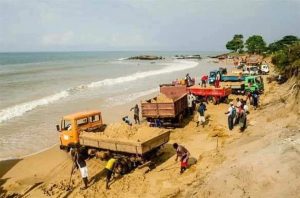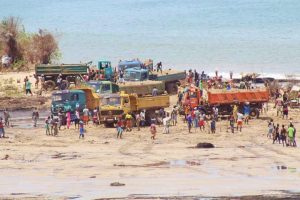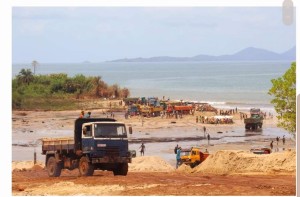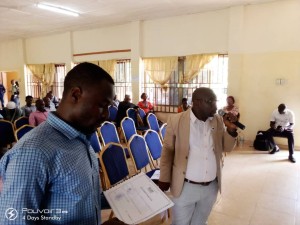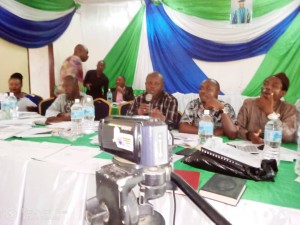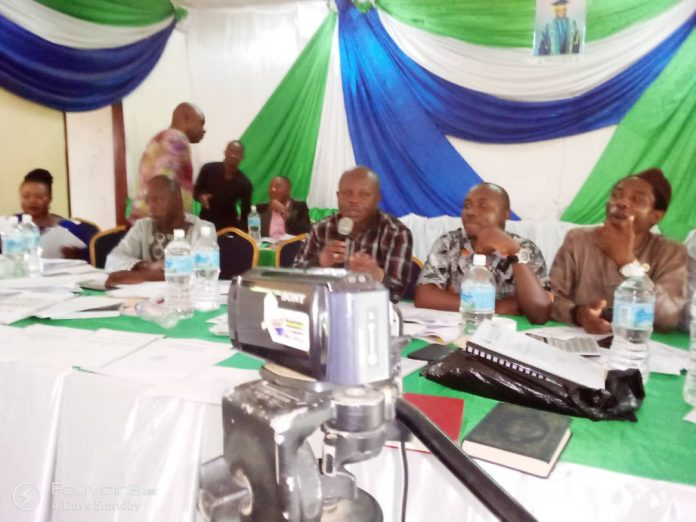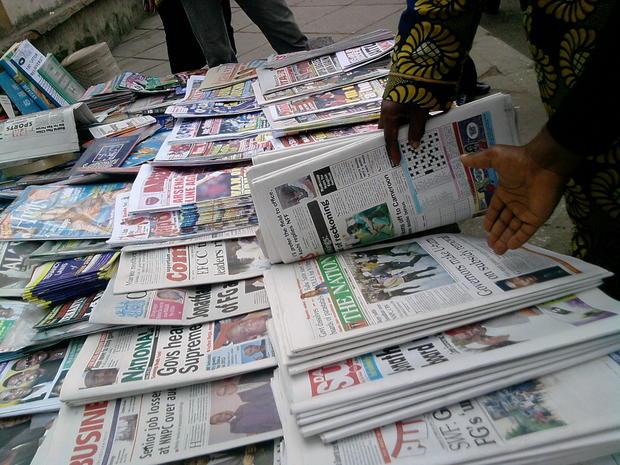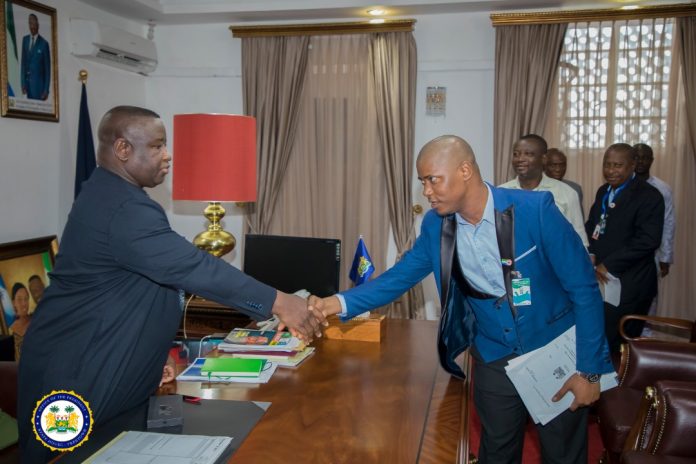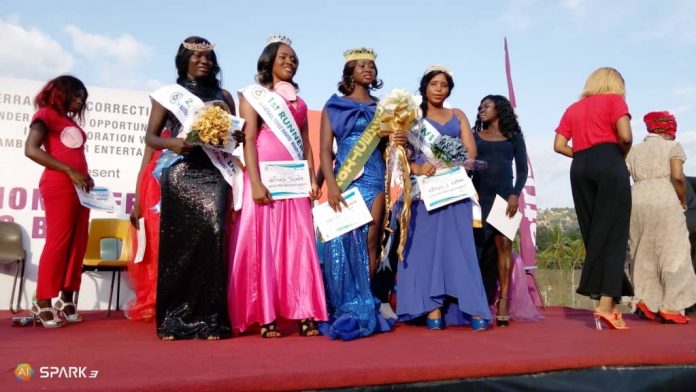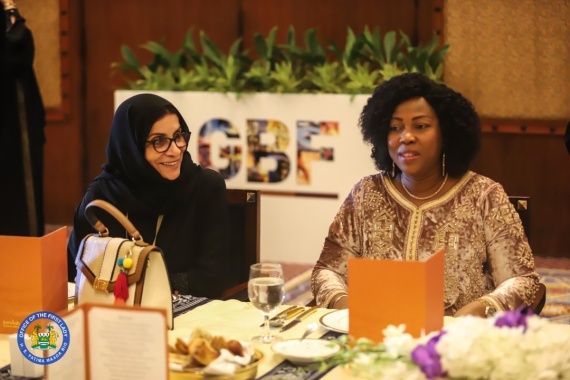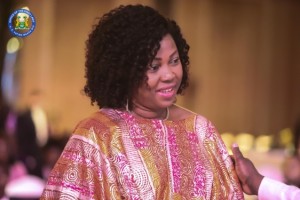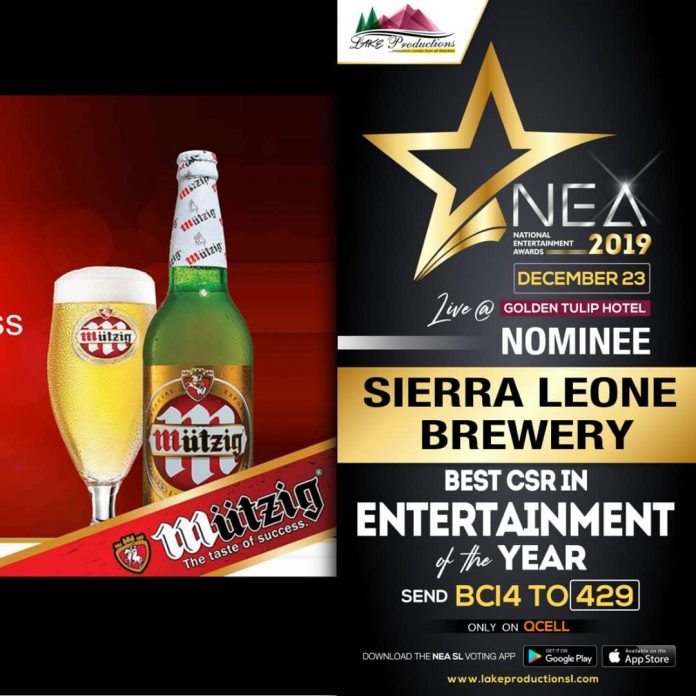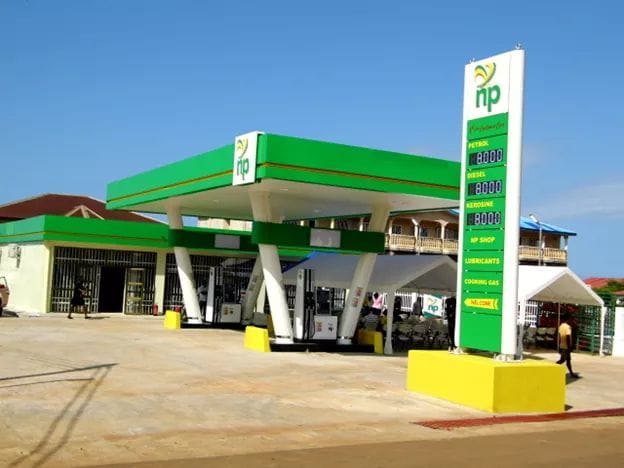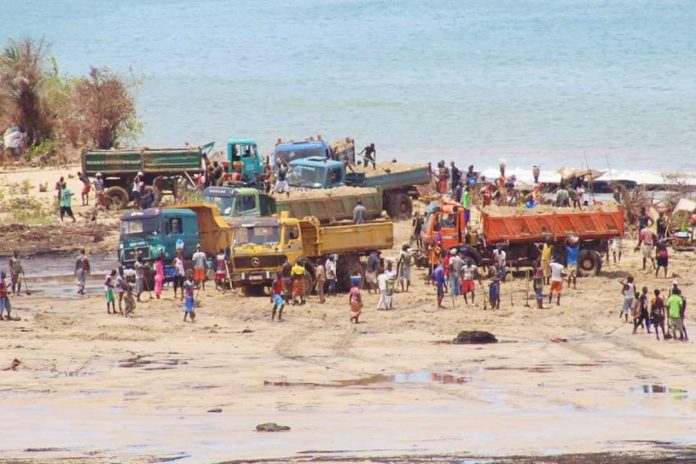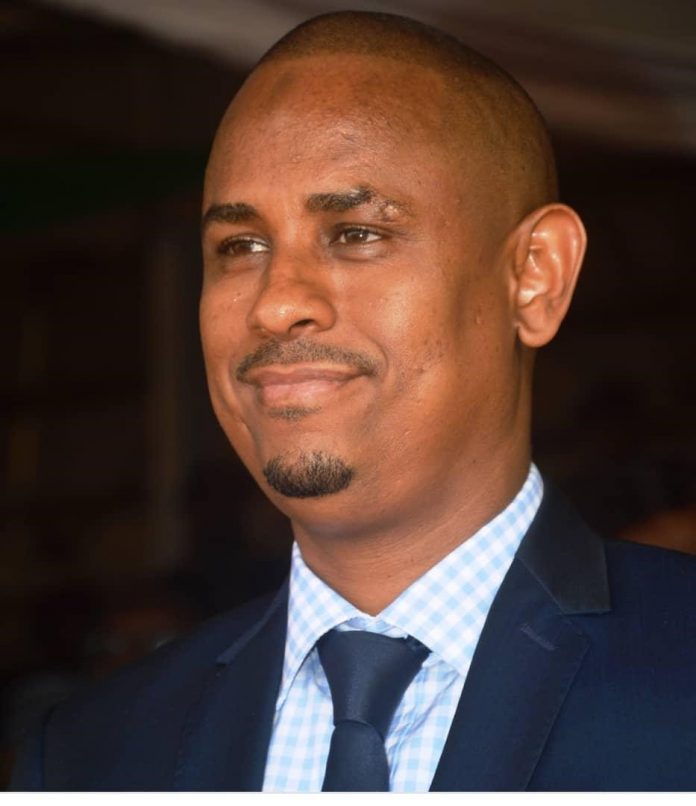By Amin Kef Sesay
Yugoslavian Consul to Sierra Leone and Chairman/CEO of DStv, Adonis Aboud, on 16th November 2019, delivered a very powerful and didactic speech during the 13th Climate and Prong official launch at the Youth Commission conference room, National Stadium in Freetown. His speech was based on the topic “Illegal Sand Mining”.
Adonis informed his audience that this beautiful country, Serra Lyoa (“Lion Mountains”), commands one of the world’s largest natural harbours and beautiful mountainous peaks furthering how as a matter of fact, the waterways stretching along the Freetown Peninsula, among others, are nature’s gifts to the capital in particular and Sierra Leone in general.
“I mean there is nothing more beautiful than the way the ocean refuses to stop kissing the shoreline no matter how many times it is sent away. These coastlines which many people and nations would die for, house beautiful beaches, along with its mountains, at the height of the glory of Sierra Leone,” he elucidated.
The unwavering diplomat and thick-skin businessman lamented that today those beaches have not only been violated but even the mountains and valleys which used to echo the cry of our beautiful nation, virtually lie in ruins as people trade the ashes of a stunning past, for an uncoordinated and selfish present at the expense of the future.
“Just as the climate issue has become everybody’s issue and yet is divisive of opinions, it is also doubtful whether there is an appreciation of the importance and enormity of our environmental problems and how they might affect our determined effort at restoring the glory and beauty of Sierra Leone,” he drew attention to the importance of dealing with climate issues.
He added that without an understanding of the magnitude of the problem, especially land degradation and the imperative of an urgent roadmap for the achievement of a successful and sustainable tourism and environmental development, the new direction of Sierra Leone becoming a tourist hotbed could just amount to nibble attempts that scratch the surface.
“I am aware that some topics are so consuming that you often wonder whether you can truly do justice to them. Today’s topic happens to be one of such, especially if you are as passionate about the issue and indeed the degradation of our natural resources, as I am. It’s so encompassing,” the CEO highlighted.
Adonis pointed out that when you see the level of devastation that has taken place on the environment and how the future is trapped in the recklessness of our behaviors one wonders how and why most people pretend or simply ignore the problem.
He implored all to think about the issue at stake and collectively ensure that we do our level best to either stop it where we can, or bang the drums until those who are empowered to do so, take action.
Adonis said from the increased flooding activities around the country to mudslides; from the loss of breeding habitats for rare species of animals and plants to chemical soil contaminations by dilapidated tippers, the indiscriminate excavation of sand as a result of stomach infrastructure, continues to damage the land that we love – our Sierra Leone.
‘It is sad that only the deep can call out to the deep. In the light of this and in a world that is being confronted with serious environmental threats, I would like to commend the organizers for this very timely reminder of the importance of all stakeholders coming together, to ensure that the danger of our environmental degradation is tackled headlong. It is better to guide and guard what we have now, jealously, for the benefits of our future generations, than to lose them and begin to search for solutions,’ he added.
“Land is a vital resource to humankind, like air and water. Land degradation—the deterioration or loss of the productive capacity of the soils for present and future—is a global challenge that affects everyone, through food insecurity, higher food prices, climate change, environmental hazards, and the loss of biodiversity and ecosystem services. Land degradation is happening at an alarming pace, contributing to a dramatic decline in the productivity of croplands and rangelands worldwide,” the Consul reiterated the enormity of the issue.
He noted that just like climate change, land degradation is one of the world’s most pressing environmental problems and it will worsen without rapid remedial action. Globally, he informed, about 25 percent of the total land area has been degraded.
“When land is degraded, soil carbon and nitrous oxide is released into the atmosphere, making land degradation one of the most important contributors to climate change. Scientists recently warned that 24 billion tons of fertile soil was being lost per year, largely due to unsustainable agriculture practices. If this trend continues, 95 percent of the Earth’s land areas could become degraded by 2050,” he maintained.
Adonis revealed how globally, 3.2 billion people are affected by land degradation, especially rural communities, smallholder farmers, and the very poor. He said the world population is projected to increase by about 35 percent to 9.7 billion in 2050, with rising demands for agricultural products including food, feed, fibre and fuel.
“In Sierra Leone, human activities as well as massive infrastructure development and boom in property business across the country over the past one and a half decade, as well as unsustainable agricultural land-use, poor soil and water management practices, deforestation, removal of natural vegetation, fuel-wood consumption and to a lesser extent, overgrazing and urbanization, have been responsible for land degradation,” he disclosed saying however it is just one aspect of land degradation that will be focused on.
“There is hardly any road or housing project that does not require a huge volume of sand from foundation to finishing. Even some roofing materials contain sand in various forms. To assuage the hunger, local and professional sand dredgers as well as multinational firms have devised various means of extracting this essential material from the ocean, streams, rivers and even ponds, mostly without recourse to best practices.
Some go the extra mile, bringing down mountains and burrowing deeper into the foot of the earth or any other place where sand can be found,” he stated pointing out that gone are the days when sand excavation was done by locals who dive to the bottom of the ocean or stream, to scoop up bucketful and offload same into canoes or riverbank. The huge appetite for sand,he posited, means that the conventional method of sourcing it is no longer adequate.
He said these days, dredgers use heavy equipment, which are able to suck sand and other materials from the riverbed in large quantity.
“For so many years, these illegal and unregulated mining activities have gone on, to the disadvantage of the country; and now, it is beginning to look like Mother Nature is whispering its disagreement for our indiscretion. It is a very sad development and we cannot fold our arms and watch our environment degraded in the manner it is being done,” Adonis admonished.
He noted that the rate of dredging and mining sand is a pointer to a disaster waiting to happen and is a call to action by various agencies and tiers of government. He called not to forget that apart from flooding and ecological degradation, intra and inter-communal crises could erupt in the future, due to land shortage owing to sand dredging.
The CEO stated that already sea beds in the Freetown area and rivers across the country are under intense pressure due to the indiscriminate extraction of construction grade sand by mining operators.
He said perhaps more importantly, illegal sand mining and dredging, which over the years has been a source of ‘cool’ revenue for those in it, poses a great threat to tourism enterprise, as beaches and other sites people would have visited for relaxation and other social activities are being devastated.
“On the economic side, illegal miners and dredgers are thieves who disallow Government from maximizing the natural resources for the good of all. Not only are they not licensed to engage in what they are doing, they are equally denying those that are lawfully permitted by law,” he stated.
He said because our land is very soft and the land is easily washed away by running water, the environmental impacts of the upsurge in land excavation and illegal sand mining, are not only proving to be disastrous, they are leading to soil erosions, formation of sinkholes, mudslides, loss of bio-diversity, deforestation, coastal erosion and loss of aquatic lives.
According to him another impact of this scourge, is the effect on wildlife, as sea animals that depend on sandy beaches for their nesting, are sent into near extinction.
He pointed out that those who rely on fishing for their livelihoods are gradually finding it difficult to make a living, thereby causing economic problems, worsening poverty and encouraging criminal activities, as illegal miners become desperate for survival stressing how the ecosystem is also destroyed and it is not good for the environment.
“We can talk on and on but until government comes up with stiff penalties, guidelines and principles to guide operations of dredging, we will keep on degrading the environment. In (looking at) the pros and cons, the negative aspect is far more debilitating. As I stated earlier, sand miners are now found in every nook and cranny as sand dredging is now a money spinning industry that spews millions of Leones for operators, even at the long term risk of communities and villages. The lack of regulations has resulted in the ease with which every Dick, Tom and Harry is getting involved in the extraction of sand,” he further bemoaned.
He said sharp sands are usually dredged from the sea bed and the lagoon, while soft ones used for plastering and smoothing of wall surfaces, are usually mined from farmlands and forests.
“But you cannot carry out the magnitude of dredging that is going on without proper investigation of the land structure and texture, because when you continue to dredge the sand, you are opening up gaps in the underbelly of the earth, while excessive in-stream sand-and-gravel mining, causes the degradation of rivers,” he stated.
Adonis said there is excessive salt presence in sea sand and if used in reinforced concrete production it severely reduces the structure’s durability because of steel corrosion occurring at much higher rates than normal.
He said in the light of the indiscriminate and increasingly worrying trend of illegal mining, there is an urgent need to step up monitoring strategies and enact policies and a comprehensive law to protect the environment. He said we need to open only certified burrow pits which will ensure that only designated areas are mined for sand. This, he stated, will restore sanity in the business and drive out the unscrupulous eggs.
He also recommended that there should be continuous training and re-training for dredging personnel, a career growth structure and grading systems established as incentives for better performance, with increased coastal surveillance to avoid illegal sand mining and other dangerous activities, such as dumping of toxic wastes.
“While dredging is also used in the development of new mega cities and other port-related towns and islands around the world, to reclaim more valuable land mass for further economic development, what comes to my mind at this point is the new Lungi Bridge project,” he said expressing hope that the Government would ensure the inclusion of maintenance dredging as part of public sector contract for capital dredging as well as Environmental Impact Assessment to determine whether it will not degrade the site or cause any harm to those living around there if sand mining is done on the site. Public sector agencies ,according to him, should insist on the inclusion of sand search report in reclamation works to avoid conflicts and losses associated with such issues.
“I also believe that a more intensive sensitisation campaign has become imperative to educate people on the adverse effects of sand excavation and other mining activities on the environment and I call on the relevant government agencies responsible for stemming this increasing tide of sand mining and dredging, to put a halt to it before it becomes a monster that will eventually consume us,” he emphasized.
Adonis said it brought to him a very salient point of the devil and the deep blue sea of this issue or what he sometimes prefer to call it, – the beauty and the beast; better known as tourism.
“It needs to be admitted that successive Governments have made efforts to develop the tourism sector but with little success. While tourism has been widely used as a tool for economic development in peripheral regions for many decades, it has been suggested that the actual practice of tourism development, is not usually informed by the planning approaches proposed by academics. Maybe this, along with the degradation of our beaches and natural reserves can be attributed to the failure, alongside the half-hearted commitment of those in power. I therefore believe that the drive by the current administration to develop this sector, while a welcome development is fraught with danger, if there is no comprehensive road map for the achievement of a successful and sustainable tourism and environmental development as well as a committed and determined step to stop the rape of our beaches and the destruction of tourist attractions,” he further anchored.
He raised the point that while donors have a long history of financing tourism projects, they rarely have a defined tourism strategy.
The CEO said supported tourism projects are under support to local development (value chains strengthening, structuring of activities, infrastructures), the preservation of cultural heritage, urban development, support to small and medium enterprises, preservation of biodiversity, and the fight against the effects of climate change. As a result, he added, most donors support sustainable tourism saying such an action has not been the result of a comprehensive and coherent vision.
The businessman said developing tourism requires a whole host of factors besides building a lovely lodge or having a wealth of beauty and wildlife on your doorstep. He maintained that a successful tourism sector relies on good safety and security, health and hygiene, infrastructure, education and training.
“Tourism booms at picnic spots with beautiful sceneries. For example, sunrise and sunset points, long sea beaches, fresh water lakes, waterfalls, etc., often attract large numbers of tourists. Growth of tourism at a particular place is also influenced by crucial factors like; how well the site is maintained,” he told the attentive audience also stating that studies, however, show that long-term anthropological fieldwork, which have critically analyzed how well, generally accepted community-based tourism resonate with the reality on the ground, reveal multiple complex issues of power and resistance that illustrate conflicts such as the resultant Government control which does not go well with those involved in illegal activities such as sand mining.
He emphasized that illegal sand mining is an issue that does not need politicization as it affects us all further recommending that we should all work as a team to find a lasting and permanent solution to it.
Adonis said the problem with us in Sierra Leone, is the law enforcement agencies cannot maintain discipline.
“Additionally, some people —way too many people—are above the law and the judicial systems are lackadaisical as are the police and other civil servants,” he highlighted expressing doubt as to who will deal with the ‘headman’.
“If our future is all that matters to us, and if we remember that as the land and environment around us degrade, the cycle of poverty worsens. meaning that those of us who feel so comfortable now, will realize that if the rope is not secure the bird perching on it will not sit comfortably also, then it will behoove us all to be like the ostrich with our head in the sand.
Let’s remember that the ears that do not listen, follow the head when it is chopped and that knowledge without wisdom is like water in the sand,” he ended with wise sayings stressing how illegal sand mining and the degradation of our land, will consume us all, if we do not do our level best to put a stop to it.
